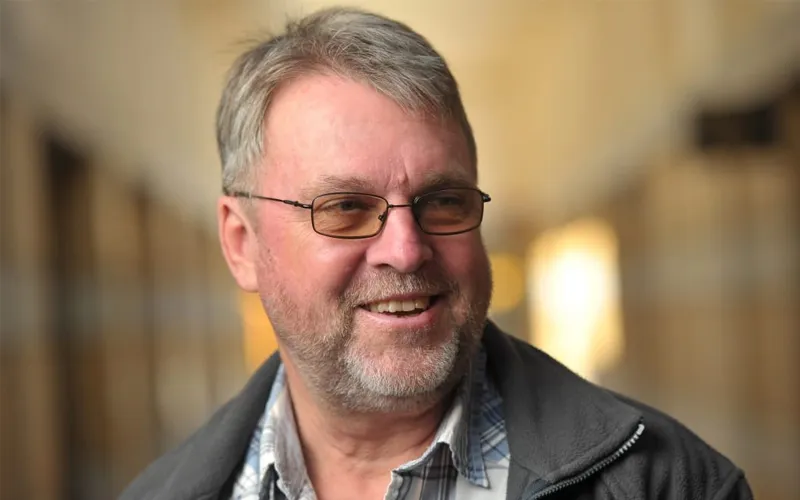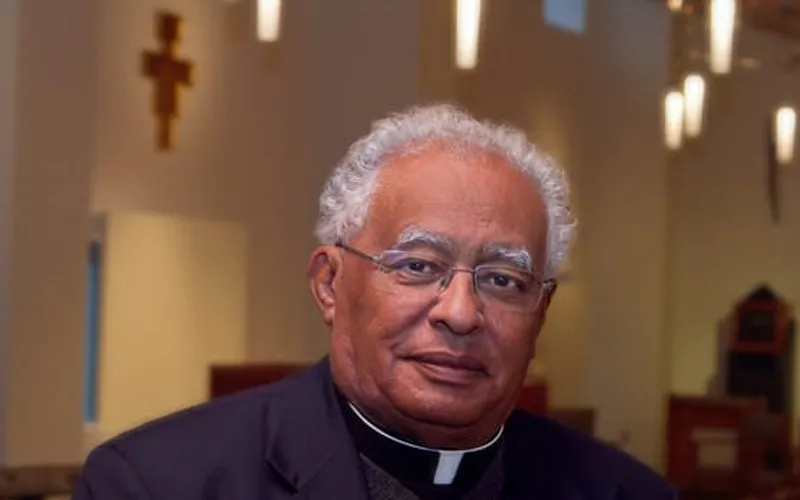“I was with the Bishop when he decided to go back to Nuba hills to check on the people he had left behind. The Bishop was devastated when he found that the people were living in caves for fear of being bombed. They didn’t have any schools, hospitals or any other social amenities. It was an area that was controlled by the rebel forces,” he says in reference to the 1983-2005 Sudanese civil war that pitted the central Sudanese government against the Sudan People's Liberation Army (SPLA).
On seeing the devastation of the people, Bishop Macram plunged into action, soliciting funds to build hospitals, schools and colleges for the people, with goodwill from the rebels.
At the time, Pope John Paul II had appointed an Apostolic Administrator of El Obeid and he lived in areas that were under the government forces. No contact was possible between the Apostolic Administrator and the exiled Bishop, Ashworth narrates to ACI Africa.
The author who has known the retired Bishop for 37 years now says, “He is a very fearless Bishop. In the middle of one of Africa's longest wars, Bishop Macram built a big hospital, the Mother of Mercy Hospital, which still serves people to date. He also dug hundreds of wells to provide families with water.”
The Bishop proceeded to Twic State in South Sudan’s Bahr el Ghazal region to help refugees who had fled from Abyei. Here, he built more schools, hospitals and Teacher Training Colleges to train local people who would teach in the schools.
(Story continues below)
Asked what motivated him to write the book, Ashworth who has been involved in the Catholic Nonviolence Initiative under the Auspices of the Vatican’s Dicastery for Promoting Integral Human Development and Pax Christi International says that the story of the brave Bishop who worked against all odds to reach out to the suffering needs to be told as he gets older.
“Everyone needs to know the story of this remarkable man, a true prophet of his time, a fearless and visionary leader who gave his all for the good of the people,” he says.
The book is the official biography of the retired Bishop who is still very active both in humanitarian work in Sudan and South Sudan and in international advocacy against injustices in both countries, especially in Sudan.
It attempts not only to tell the story of a remarkable man but also to reflect on some of the dynamics within Sudan.
Ashworth started writing the book two years ago and it was published towards the end of last month. It took the author longer to publish the book owing to the COVID-19 restrictions, which limited his interactions with the Bishop.
The 200-page book, which has an additional 60 pages of appendices including colored and black-and-white images detailing the experiences of the Bishop as well as some of his moving speeches in international platforms is a good read for locals and the international community alike.
The book has 20 chapters also detailing the social, political and economic context in which Bishop Macram worked in Sudan and in South Sudan. Some of these chapters have been authored by the Bishop’s collaborators and details some of the Bishop’s most painful experiences especially at the height of his battle with cancer.
Ashworth describes a particular incident when the Bishop’s health was waning, saying “There’s a day that we flew in an ancient DC3 piston-engined plane into Sudan from Nairobi and we were walking up the mountain, some four hours’ distance to a Parish where the Bishop celebrated Holy Mass with the people and I remember him collapsing. He was very sick.”
In the book, Ashworth who also authored “The Voice of the Voiceless: The Role of the Church in the Sudanese Civil War 1983-2005” recalls one of Bishop Macram’s biggest heartaches when a foundation he had built, which served thousands of vulnerable groups in Central Sudan, was snatched away from him.

“The Bishop set up the foundation in America to collect the money to help the people in Sudan. Later, the foundation’s board of trustees voted him out. He challenged them in court but unfortunately, some of the board members were lawyers and so, he lost the case and this caused a lot of problems for his work in the Nuba mountains,” Ashworth tells ACI Africa, and adds, “I have explored this topic in detail in the book.”
The book also talks about how the Bishop went to most volatile areas in Sudan at the height of the violence and how, on several occasions, he escaped death by a whisker when the Holy Mass he was celebrating was the target of bombers.
Ashworth who currently lives in rural Kenya, working on a model railway layout for the continent, says that the book, which will be on sale in the Pauline Sisters’ bookshop in Nairobi, is important for the people of Sudan and South Sudan “to know about the prophet they had” and to also help them navigate through the challenges they face.
The book is also an eye opener for the international community who Ashworth says always look down upon Africans.
“The world, especially the international community, should know that Africa has its people who can fight their challenges that face their people,” he says, adding that apart from Kenya, the book will also be available in Kampala, Uganda, and in Juba, South Sudan at the old St. Joseph’s Parish, opposite Juba Teaching Hospital.
Agnes Aineah is a Kenyan journalist with a background in digital and newspaper reporting. She holds a Master of Arts in Digital Journalism from the Aga Khan University, Graduate School of Media and Communications and a Bachelor's Degree in Linguistics, Media and Communications from Kenya's Moi University. Agnes currently serves as a journalist for ACI Africa.










